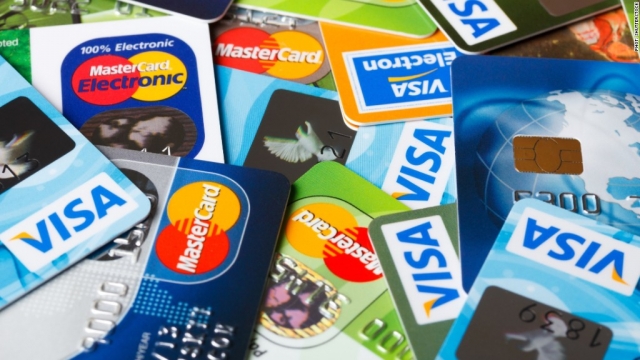Credit cards are fantastic little pieces of plastic. They pay for things when we have forgotten to go to the cash machine. They pay for things when payday is still a few days away. They pay for things that we really can’t afford but can’t resist either. On top of all this, they reward us with airmiles, cash back, ClubCard and Nectar points. They protect us from online fraud and with chip and pin technology, they protect us from offline scams as well. They work seamlessly online and via our mobile phones and they look pretty good too if you’re lucky enough to have a gold, platinum or black one!
 There is, of course, a downside to our little flexible friends – debt! And this comes about when we use them irresponsibly. When this happens, they go from being a handy tool and financial safety net, to be a major source of financial stress and strain. So to help you find the best possible deals and avoid the most common pitfalls, here are our top 12 tips for managing your plastic in 2016.
There is, of course, a downside to our little flexible friends – debt! And this comes about when we use them irresponsibly. When this happens, they go from being a handy tool and financial safety net, to be a major source of financial stress and strain. So to help you find the best possible deals and avoid the most common pitfalls, here are our top 12 tips for managing your plastic in 2016.
Pay In Full Every Month
Whenever possible, always pay the outstanding amount in full each month. While it might be tempting to pay just the minimum monthly payment, this leads to interest being added to the balance. You will also benefit from an improved credit score as you are seen to be dealing with your “debt” regularly and on time.
Shop Around And Switch Lenders
If you have an outstanding balance on any of your credit cards then you should always be shopping around for 0% balance transfer deal to decrease your interest rate and give you time to pay off the debt before interest is added. There are offers of up to 40 months interest-free out there – see our article here.
Improve Your Credit Score
Having a credit card will improve your credit score, making it easier for you to apply for things like loans and mortgages. The key to improving your credit score with a credit card is to pay off your outstanding balance on time every month. Its also recommended to keep your balance at around 70% of your credit limit. This shows you are a responsible borrower with a low-risk profile – lenders favourite type of consumer.

Set Up A Direct Debit
It’s very easy to forget to pay your credit cards on time, so we strongly recommend setting up a regular direct debit to avoid any late payments and subsequent charges and interest on your account. Remember that late payments will also affect your credit rating.
Call In Advance If You Are Having Trouble Paying Off Your Credit Card
If your personal financial situation gets worse and you know you’re not going to be able to pay off your credit card balance in the next few months its worth making a proactive call to your lender to explain your situation. By doing this, your lender will be able to structure a repayment plan with you which will give you more time to pay off the balance at possible a lower interest rate. There is also less chance of your credit score being affected if you miss or delay a payment.
Benefit From Cashback Cards
Many credit cards now offer some form of cashback program (either money is credited back to your card, or reward points are issued). When choosing one of these cards make sure the benefits outweigh the potential downsides. Used properly, these cards can be a great way to get more for your money, but they often have higher interest rates and penalties. There is no such thing as a free lunch!
Know Your Rights & Responsibilities
Always make sure you always read the small print and clearly understand your rights when using the credit card, e.g. if the goods purchased are subsequently lost, stolen or faulty. Beware of things like Payment Protection Insurance and fees for replacement cards. If you lose your credit card or receive a text that shows a transaction you do not recognise it is vitally important you call your lender immediately to block that card. You are protected against fraud but it’s up to you to prove this, and it can be a long and arduous process. In the meantime, you may find your credit card locked so you cannot use it.
Spending Abroad
Credit cards are a fantastic way to spend money abroad. You can minimise the amount of cash you carry and avoid inconvenient travellers cheques. Make sure you check the currency rate before travelling and make sure you can pay off the credit card in full when you get back before interest starts to accrue.
Get Freebies
Look out for credit card deals offering travel insurance discounted flights or shopping vouchers. Deals like this are often linked to balance transfers so again, keep an eye on financial comparison websites like MoneySupermarket and Compare The Market to find the best deals.
Extended Warranties
Some credit cards offer free extended warranties on electrical items like TV’s and Laptops, provided you used the card to purchase the item. These are ideal for expensive purchases including electronics and white goods and offer a free alternative to the retailers own “extended warranty” rip-offs.
Negotiate With Your Lender
You’ll be surprised to discover how often credit card companies reduce interest rates charged to their best customers. So if you are someone who regularly uses the card but always pays on time, it’s worth calling them to discuss getting a better deal. If you mention you are thinking of moving to a new credit card company they will likely try to persuade you to stay with them on better terms.
Never, EVER Withdraw Cash From Your Credit Card
If you think the interest rate charged on your credit card is high – check out how much more they charge you for withdrawing money from it as a cash advance. It’s not uncommon to be charged up to 5% of the amount as a cash advance fee plus a fixed ATM fee of up to £5. You’ll pay a higher APR rate on the cash advance fee and there is usually no interest-free grace period on your cash advanced which means you’ll start paying interest from the moment you withdraw. It’s not quite as bad as a pay day loan but its not far off! Avoid at all costs.
 Disclaimer: TheMoneyDaily’s service is not intended to be, nor should it be construed as financial advice. We help our readers make informed decisions and can introduce you to comparison services and provide impartial information and guides. Where appropriate, we may introduce FCA authorised partners who can provide services relating to financial products.
Disclaimer: TheMoneyDaily’s service is not intended to be, nor should it be construed as financial advice. We help our readers make informed decisions and can introduce you to comparison services and provide impartial information and guides. Where appropriate, we may introduce FCA authorised partners who can provide services relating to financial products.









